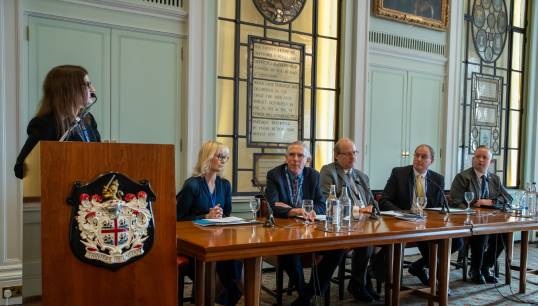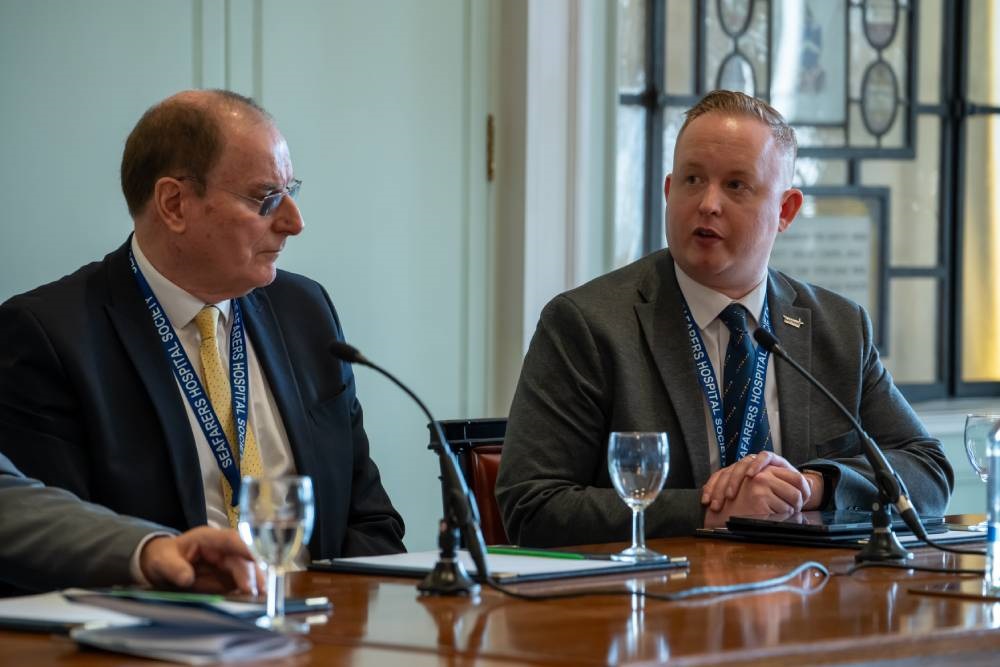- Topics
- Campaigning
- Careers
- Colleges
- Community
- Education and training
- Environment
- Equality
- Federation
- General secretary message
- Government
- Health and safety
- History
- Industrial
- International
- Law
- Members at work
- Nautilus news
- Nautilus partnerships
- Netherlands
- Open days
- Opinion
- Organising
- Podcasts from Nautilus
- Sponsored content
- Switzerland
- Technology
- Ukraine
- United Kingdom
- Welfare

A major industry conference has investigated what the future of the maritime workforce could look like – from the seafarer's perspective. Deborah McPherson reports
With industry events so often about introducing new technology or increasing profits, February's Sustainability at Sea conference had a refreshing focus on the importance of treating workers well.
Hosted by the Seafarers Hospital Society (SHS) at Trinity House in London, the event explored challenges and opportunities in recruitment and benchmarking for creating and implementing good workplace policies and company cultures. Also high on the agenda were supporting the physical and mental health of maritime workers, and best practices when it comes to advancing maritime workers' careers.
To kick off the programme of panel discussions and presentations, there was an opening address by former UK maritime minister Nusrat Ghani, now the minister of state for industry and economic security, who told attendees that her department was doing all it could to protect seafarers at home and abroad.
Representing Nautilus members
Nautilus head of international relations Danny McGowan took part in the conference's first panel discussion, which addressed the many challenges the maritime industry has faced over the last four years: the Covid-19 pandemic; rising geopolitical risks and economic instability; regulatory pressure; and the transition to decarbonised and digitalised operations.
Also in attendance were Nautilus head of professional and technical David Appleton in his capacity as an SHS trustee, and Andrew Jones, Nautilus director of welfare and care.
Resilience vs endurance
During a point on building resilience among crews, Mr McGowan pointed out that 'enduring' poor conditions and pay was not the same thing as resilience. Seafarers accept that mental resilience is needed for their line of work, in order to deal with long separations from family and friends. But this resilience should not include the need to 'endure' poor conditions and pay, or abuse. The perception that 'resilience' involves suffering mistreatment without complaint is a barrier to young people choosing seafaring careers at a time when the industry needs to increase recruitment.

Nautilus head of international relations Danny McGowan stressed the importance of putting seafarers' wellbeing before profit. Image: SHS
'Seafarers should have the same rights and enjoyment of life in their careers as shoreside workers,' he continued. 'Whether shipowners are regulated to do this, or through moral obligations, at some point the situation will be forced into it, otherwise we won't get people to come and work in our industry.'
Prioritising seafarers' lives in conflict zones
In the context of vessel transits of the Red Sea, Mr McGowan commented: 'Seafarers need to be put before profits'.
Dave Watkins of CHIRP said it was important for the maritime industry to be more transparent in showing what it was doing to 'recover its people' being attacked in high risk areas – such as the crew of the Galaxy Leader, who were taken hostage in the Red Sea.
Jan de Boer (International Maritime Organization) commented there were 57% fewer ships transiting the Red Sea since the latest Middle East conflict. In terms of security, however, he said the IMO's role was limited to political lobbying to try and ensure seafarers were out of harm's way and that more ships were not sent into warlike zones: 'We cannot unfortunately send in the SAS, but the British government is a superb example of [how to] send in [a national] force.'
Listening to cadets
Attendees also heard from a handful of cadets from Warsash Maritime School and City of Glasgow College, who were asked what they would change about the industry if they could. Their wish list echoed Nautilus International's campaigning work for members: free internet connectivity; a reduction of harassment and abuse; better recreational facilities onboard; and a mentor allocated to each cadet offering guidance on how to adapt to life at sea.

There were some specific suggestions to make more use of artificial intelligence (AI) by having access to online chat tools for 24 hour assistance – although this would again depend on the free availability of wi-fi. Frustration was expressed that the maritime industry is so far behind shoreside companies, in terms of tackling workplace abuse and bullying.
Welfare research and resources
The conference provided a platform to present a major new academic study: Understanding seafarer roster patterns and fatigue on vessels. Carried out by the UK Department for Transport, the report was presented to the conference by researcher Sophia Ridden .
The host organisation SHS also took the opportunity to launch its key performance indicator (KPI) toolkit to help organisations track regulatory compliance and year-on-year impact on seafarer health and welfare.
Tags
More articles
Seafarer fatigue: the weary weight of evidence
Toolkit launched to monitor seafarers' health
Seafarers Hospital Society (SHS) has launched a key performance indicator (KPI) toolkit to help maritime organisations track regulatory compliance and year-on-year impact on seafarer health and welfare.
